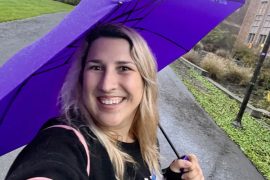Latest News
Stories about the Allen School’s people, research and impact.
-
June 4, 2025 -
Allen School News
Sharma (Ph.D., ‘24) won the 2024 award from the Association for Computing Machinery for leveraging AI to make high-quality mental health support more accessible, and Min (Ph.D., ‘24) received an honorable mention for developing a new class of efficient and flexible language models.
-
May 28, 2025 -
Allen School News
Starting fall 2025, this new part-time evening program is designed to help working professionals across a range of industries to understand and leverage the latest artificial intelligence and machine learning techniques as part of their work.
-
May 15, 2025 -
Allen School News
Researchers in the Allen School’s Security & Privacy Research Lab studied online ads and found that not only can they be annoying, but they are also inaccessible for screen reader users. Their work earned a Best Paper Award at last year’s Internet Measurement Conference.
-
May 14, 2025 -
Allen School News
Armon Dadgar (B.S., ‘11) co-founded the high-flying cloud company HashiCorp inspired by an undergraduate research project. Now he and partner Joshua Kalla hope to sow the seeds of the next HashiCorp with a new professorship and support for a new generation of innovators and entrepreneurs.
-
May 12, 2025 -
University of Washington Magazine
Allen School Ph.D. student Kate Glazko and her collaborators at UW CREATE explore how generative technologies can be both a help and a hindrance for people with disabilities.
-
May 9, 2025 -
UW News
A team in the Mobile Intelligence Lab developed Spatial Speech Translation to enable simultaneous translation in group conversations while preserving the direction and qualities of each person’s voice.
-
May 8, 2025 -
UW News
Researchers in the Allen School’s UbiComp Lab created the ProxiCycle sensor system to get a handle on which routes are best — and worst — for bikes, finding a significant correlation between the sensor data and other indicators of cycling risk.
-
April 23, 2025 -
Allen School News
The ACM Special Interest Group on Computer-Human Interaction recognized Fogarty’s leadership and contributions to human-computer interaction research including ubiquitous computing, interactive machine learning, accessibility and personal health informatics.
-
April 21, 2025 -
University of Washington
Undergraduates Hisham Batti and Eric Xiao, B.S./M.S. student Heer Patel and Ph.D. student Ananditha Raghunath were recognized for making the most of their time at UW to make a difference on campus and in their communities.
-
April 14, 2025 -
Allen School News
Deeds introduced partition constraints, a new approach for making conjunctive query executions more efficient. He presented the research at the 28th International Conference on Database Theory (ICDT), earning both the Best Student Paper and Best Paper Awards.










